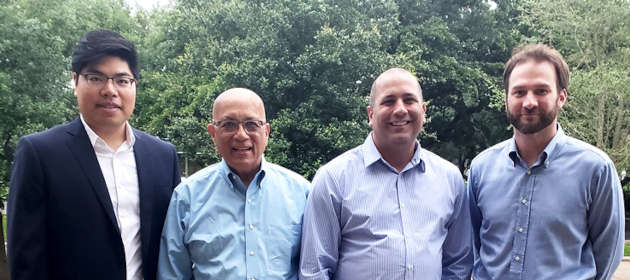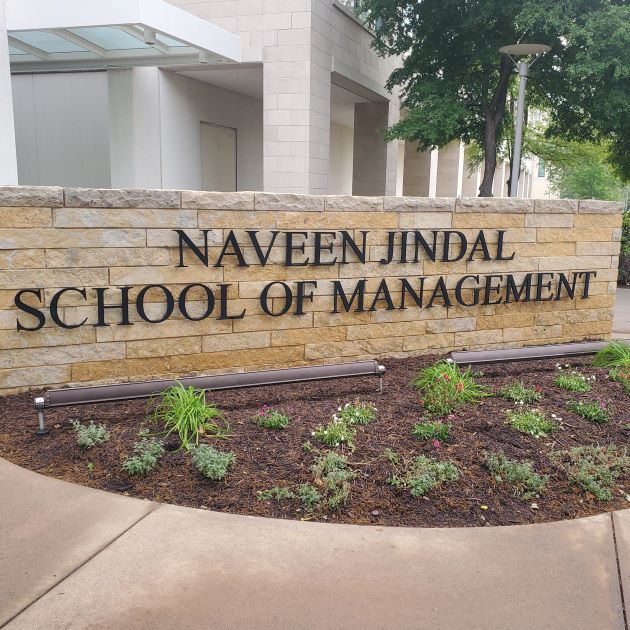
Business analytics graduate students in the Naveen Jindal School of Management recently helped a Dallas nonprofit map a route to reducing childhood poverty in Dallas.
Chung-Min (Jack) Chen, MS’19, and Vandhana Kalyanaraman, MS’19, both knew they would be working on a project that would have real-world implications when they enrolled in Dr. Ron Bose’s Analytics Practicum (BUAN 6390) course during their final semester last spring.
Practicum students worked on a data analytics project for Child Poverty Action Lab, a childhood poverty reduction initiative unveiled late in 2018 by then-Dallas Mayor Mike Rawlings. A major focus of the initiative is improved accessibility via public transportation to jobs that pay a living wage (best defined within the U.S. Census Bureau’s LODES database as jobs paying $3,333 per month). . The students investigated what types of access barriers exist to jobs, medical clinics and grocery stores for families that rely on public transportation versus those families that have access to personal vehicles.
Twenty-five students — five groups of five students each — worked on the project. They combined their results and presented them to Alan Cohen, executive director of CPAL. The students also worked closely with Robert Mundinger, who runs TheMap.net, an interactive website that allows users to create custom maps from a wide variety of demographic data points for the city of Dallas.
In their wide-ranging analysis of accessibility to jobs, grocery stores and medical clinics, the students determined:
- 35 percent of jobs that pay a living wage in Dallas are accessible within 30 minutes via public transportation such as DART Rail or buses.
- 69 percent of living-wage jobs can be reached within an hour.
Lack of public transportation to jobs, medical clinics and grocery stores, and long daily commutes are a significant burden for lower-income families.
To solve this accessibility problem, the student teams recommended subsidized ride-share solutions, deployment of electric scooters to inaccessible areas and an increase in the number of DART bus routes and express and shuttle services during peak commute times.
Cohen and his team will present those maps to community and government leaders and attempt to persuade them about what courses of action will help accessibility to health clinics, grocery stores and the U.S. Department of Agriculture’s Special Supplemental Nutrition Program for Women, Infants and Children — WIC — centers.
The idea for the project came about after Bose read a D Magazine article describing Mundinger’s work using mapping software for the City of Dallas. Bose contacted Mundinger and told him the work he was doing was something he would like to introduce to his students. Getting students involved in service projects would teach them to use their analytics skills to solve problems and make a difference in the community, Bose said.
“We get projects from many large for-profit companies, but I know full well that often, they can do the project better than my students can,” he said. “They have the resources to do those kinds of things, whereas most nonprofits don’t have as many.”
Mundinger had worked with Cohen and told him about Bose’s idea. Cohen jumped on the opportunity to involve students, believing ongoing data analysis to be a key ingredient for making CPAL’s roadmap actionable and achievable.
“The roadmap shows us a set of outcomes related to each of our categories, that if we are able to reach this outcome over a 20-year period, cumulatively, then that would get us to a 50 percent decrease in child poverty,” Cohen said. “A lot of the work done by this class was helping us break these problems into smaller and smaller pieces so that we could find some that are actually actionable.”
Cohen said that he has seen significant investments in databases within the social sector and government to help root out societal problems. What is often lacking, he said, is human capital and analysis.
“Very often, we’re stuck in the social sector using data to admire the problem,” he said. “That’s what we don’t want to do. We want to understand the problem and then use data to push us toward solutions.”
Cohen knew from experience that it can be easy for those who are most intimately involved in trying to solve a problem to develop blind spots that can make solutions easy to overlook.
“High-performing teams examine their blind spots, and this group of students helped us do that,” Cohen said. “They came at it with completely fresh sets of eyes just looking at the data.”
The students quickly learned that real-world projects do not always come with clean, ready-made data sets that are perfectly suited for them. The students had to plough through data from the U.S. Census Bureau’s American Community Survey, an ongoing data collection project that compiles a slew of demographic data ranging from number of vehicles available to commuting patterns and characteristics, to job accessibility and wages. The students also learned how to access public data and software tools provided by companies such as Google.
“Students often have the expectation that they are going to have nice clean proprietary data sets to work with,” Bose said. “That’s not how it works in the real world. Nobody’s going to give you the data; you have to go find it. To get the answers you want, you need to be able to use public data as well as proprietary data. That is the skill the students were forced to learn.”
“It was actually a really good learning experience,” Kalyanaraman said. “In other classes, we use what we learned during the semester in that one particular course. With this class, we took everything we had learned throughout the master’s program and put it together in one single project.”
“What I hope the students got out of this is the skill to be creative, to be able to take it to their next job” Mundinger said. “I think that skill is super, super important.”
Some other learning outcomes for the students that can benefit them in the business world, Cohen said, were to be able to embrace ambiguity as well as attain a certain level of empathy.
“Once they had gone through the process of capturing data, running some numbers and mapping things out — there is a level of empathy required to make this data meaningful in this kind of social-sector work,” Cohen said. “You have to start thinking of use cases. How does this data or this insight actually apply to real people? Then you start coming up with scenarios and assumptions that we can go on and test, but the empathy that came through in the recommendations — that is something that a computer just simply can’t do.”
Chen, who graduated in May, started the project knowing that his work would potentially help reduce childhood poverty in Dallas. “That really inspired us to do more,” he said. “We thought more about we could actually do to use our abilities to help people.”






